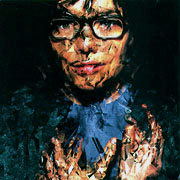
Selmasongs
Björk
2000: Elektra 62533-2
Beautiful, especially breathtaking on headphones, but if you’ve seen the film (“Dancer in the Dark”) the songs aren’t just drenched with sorrow, they’re downright nihilistic. A great album to tip you into a depressive coma, partly because she’s encased a fragile, flickering joy within each song…and you hear it overwhelmed every time. Strong but so must you be if you’re going to swim in these waters.
Looking beyond the pervasive veil of sorrow, the detail-rich soundscape is a fantastic delight, especially on headphones and especially on “Cvalda” and “In the Musicals.” The album and film most intimately interlink on “In the Musicals,” which vividly presents the little sounds which form the rhythms Selma hears that transport her into her fantasy world; the basketball, the chalk, the drumming-practice, and more are captured, distilled, and transformed into mesmerizing and beautiful vehicles for Selma’s visions. “I’ve Seen It All” and “Scatterheart” do the same but in more subdued and darker contexts; I personally dislike “I’ve Seen It All” because of the shoddy performance of both vocalists (breaths breaking phrases not for effect but because they weren’t breathing wisely, passionless delivery, et cetera), but “Scatterheart” is deeply and sadly hypnotic especially in its film context.
The opening theme is somber and majestic, a gorgeous piece, and as it plays during the artistically abstract opening credits of the film it certainly is intriguing; its fulfillment in the closing track (“New World”) is a bit misleading on the CD, given the song’s, uh, cutoff in the film, but otherwise is magnificently sweet with heavy overtones of doom, and the album version delivers a mighty closing that the film’s story literally cannot provide. “107 Steps” I still haven’t come to terms with: as a track on its own it’s odd but impressive, in the film it’s surprisingly intensely moving, and considering both it’s mostly a sob-inducing curveball…but somehow it also misses me. I think that’s because of its slow and vague middle section, because the whispered tension of the opening and the tragic drama of the closing are hefty considerations.
If there’s a drawback to this album, besides its overall negative plummeting, I’d reluctantly say that it’s the fact that Björk is very much Björk here…there’s no prayer of dissasociating the voice unless this is the very first Björk album you ever hear; it’s different with the film, where she’s not so obviously Björk and where all the characters are painted with a depressingly constrained palette.
Comments © 2005 Mark Ellis Walker, except as noted, and no claim is made to the images and quoted lyrics.